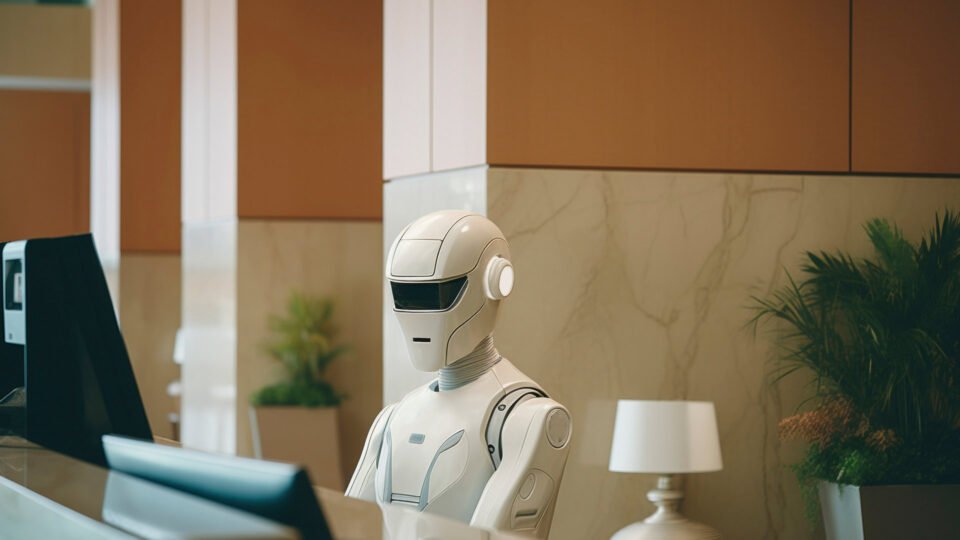Witness how AI transforms hospitality, enhancing personalization, efficiency, and innovation in the restaurant industry.
As the CEO of Slang.ai, I’ve always been fascinated by the intersection of technology and human experiences, especially within the realm of hospitality. The focus on customer service and the overall experience, the high energy and pace of restaurants and the ability to create memorable dining moments have always inspired me to explore how advanced technologies like Artificial Intelligence (AI) can revolutionize the way we engage with guests and optimize operations.
We realized early on when we were creating Slang.ai, our restaurant phone/concierge service based on AI, the profound shift in how technology can impact a business and a guest’s experiences. This can also have a major impact on overall and operational efficiency. As an advocate for advanced technology, I am deeply invested in exploring the transformative potential of AI within the hospitality sector, particularly its role in reshaping the restaurant landscape.
The Current State of the Restaurant Industry
Before delving into AI’s impact, it’s crucial to understand the challenges facing the restaurant industry today. In recent years, restaurants have dealt with evolving consumer preferences, intense competition, and rising operational costs. The COVID-19 pandemic accelerated the need for innovative solutions to adapt to changing consumer behaviors and ensure business continuity.
One of the fundamental shifts in consumer expectations revolves around personalized experiences. Diners seek more than just a meal—they want a memorable interaction and tailored services that cater to their preferences. This shift necessitates a paradigm change in how restaurants operate and engage with their patrons.
AI: Empowering Personalization and Customization
AI has many uses in the restaurant industry. It has emerged as a game-changer – from enabling restaurants to analyze vast datasets and glean actionable insights to personalize guest experiences, and phone answering services.
Imagine a scenario where a guest, based on their reservation, is greeted by name, and offered their favorite dishes based on past dining history. This level of personalization not only enhances guest satisfaction but also cultivates customer loyalty—a critical factor in a competitive market.
AI-driven recommendation engines can anticipate diner preferences, curate customized menu suggestions, and even adjust portion sizes based on individual dietary requirements. By leveraging AI, restaurants can elevate service standards and create memorable dining experiences tailored to each guest’s preferences.
Predictive Analytics: Anticipating and Responding to Consumer Trends
Beyond personalization, AI-driven predictive analytics empowers restaurants to anticipate consumer trends and adapt their offerings accordingly. By analyzing historical data such as order patterns, dining preferences, and seasonal variations, AI can forecast demand, optimize inventory levels, and fine-tune pricing strategies in real-time.
For instance, a restaurant equipped with AI-powered analytics can predict which dishes are likely to be popular on a given day, adjust ingredient procurement to minimize waste, and optimize menu pricing based on market demand. This proactive approach not only enhances operational efficiency but also ensures that restaurants stay agile and responsive to changing consumer behaviors. And, it will sync with the phone answer system so when guests call or inquire about new menus, or dietary questions, AI can respond with accurate and updated information.
Enhancing Operational Efficiency through Automation
AI’s impact extends beyond guest interactions to streamline restaurant operations and enhance overall efficiency. Automation powered by AI can revolutionize various facets of restaurant management, including reservations, order processing, inventory management, and customer service.
Consider the role of AI in handling customer inquiries and reservations – reducing wait times and enhancing service efficiency. In the kitchen, AI can optimize food preparation processes by predicting cooking times, minimizing errors, and improving consistency. AI-enabled analytics tools provide actionable insights to restaurant managers, enabling data-driven decision-making to optimize resource allocation and drive profitability.
Addressing Labor Challenges
Another significant benefit of AI adoption in the restaurant industry is its potential to address labor shortages and rising labor costs. With AI-powered automation handling routine tasks, restaurant staff can focus on delivering personalized service and enhancing guest experiences versus answering the phones or taking reservations. This shift not only improves operational efficiency but also empowers employees to leverage technology as a tool to augment their skills and productivity.
Preserving the Human Element of Hospitality
Despite the transformative power of AI, it’s essential to strike a balance between technology-driven innovation and the human touch that defines hospitality. As the renowned chef Julia Child famously said, “The secret of a successful restaurant is sharp knives and sharp people.” Technology should complement—not replace—the passion, dedication, and expertise of restaurant staff.
AI serves as an enabler that empowers restaurant teams to elevate their service standards and focus on creating meaningful connections with guests. By leveraging AI to automate repetitive tasks and streamline operations, such as answering the phones, restaurants can allocate more resources to training and empowering their staff to excel in delivering exceptional experiences.
The Road Ahead:
As we look ahead, the integration of AI into the restaurant industry represents a transformative opportunity to redefine guest experiences and operational efficiency. AI’s ability to take on all the aforementioned tasks underscores its potential as a catalyst for innovation.
Successful AI adoption requires a strategic approach that prioritizes collaboration, experimentation, and continuous improvement. Restaurant owners and operators must invest in AI technologies that align with their business goals, engage with industry experts to navigate implementation challenges, and cultivate a culture of innovation that embraces technology as an enabler of excellence.
As we embark on this transformative journey, let us embrace AI as a catalyst for innovation while preserving the timeless principles of hospitality that define our industry. Together, we can usher in a new era of dining excellence where technology enhances—rather than diminishes—the human connection at the heart of every memorable dining experience.
Let’s continue to explore, experiment, and innovate, guided by our shared vision of leveraging AI to create a more personalized, efficient, and sustainable future for the hospitality industry.
Explore AITechPark for top AI, IoT, Cybersecurity advancements, And amplify your reach through guest posts and link collaboration.

